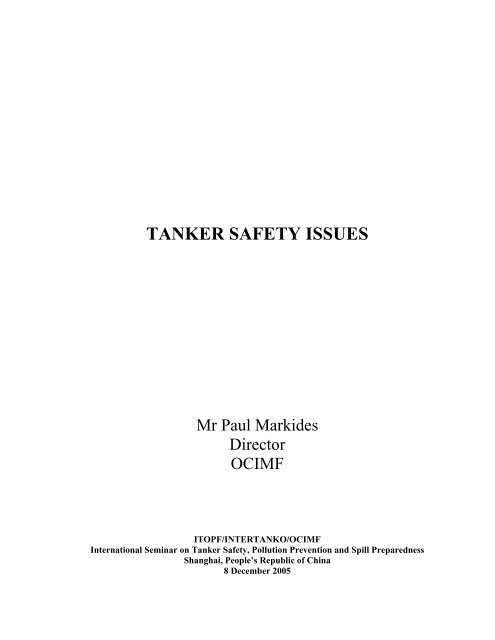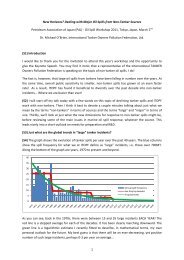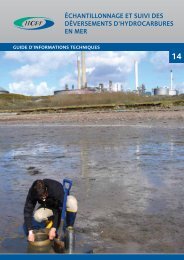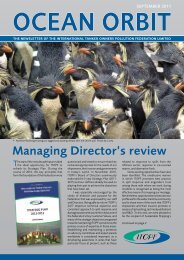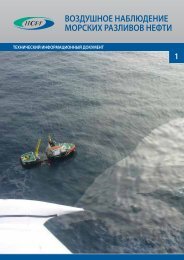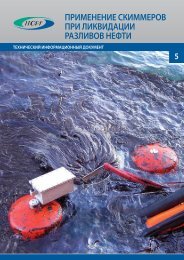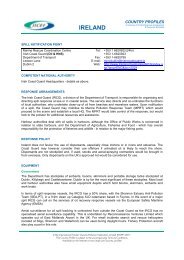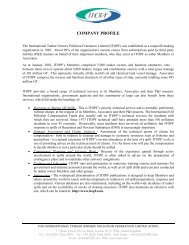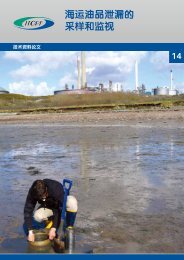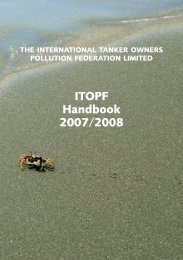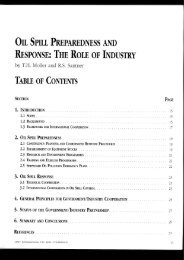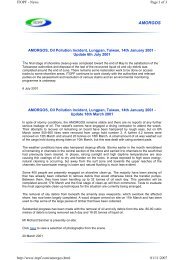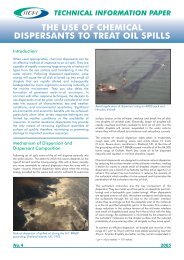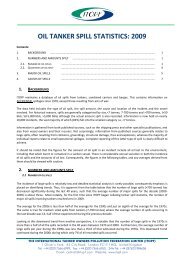TANKER SAFETY ISSUES - ITOPF
TANKER SAFETY ISSUES - ITOPF
TANKER SAFETY ISSUES - ITOPF
Create successful ePaper yourself
Turn your PDF publications into a flip-book with our unique Google optimized e-Paper software.
<strong>TANKER</strong> <strong>SAFETY</strong> <strong>ISSUES</strong>Mr Paul MarkidesDirectorOCIMF<strong>ITOPF</strong>/INTERTANKO/OCIMFInternational Seminar on Tanker Safety, Pollution Prevention and Spill PreparednessShanghai, People’s Republic of China8 December 2005
A Voice For SafetyGood morning. It is, indeed, a pleasure to be here in the beautiful city of Shanghaiand to have this opportunity to share with you the views of the Oil CompaniesInternational Marine Forum (OCIMF) on the very important topic of safetransportation systems.The key points I plan to cover in this presentation are:1. A brief overview of OCIMF2. Tanker quality3. Enforcement of existing legislation4. Double hulls5. Structural integrity6. Port and terminal safety7. Maritime safety – a holistic approachFor those who may not be familiar with OCIMF, I would like to take a moment todescribe our organisation and it’s purpose.The Oil Companies International Marine Forum was established in 1970 in responseto increasing public awareness of marine pollution by oil in the wake of, what wasthen, the world’s worst oil spill – the grounding of the Torrey Canyon in 1967. OCIMFcurrently has 55 Members including virtually every major oil company in the world.The principal thrust of our activities is the same now as it was in 1970 and that is theprovision to our members, and all those involved in the business of oil transportationby sea, of high quality technical advice on all aspects of the safe andenvironmentally responsible operation of oil tankers and terminals.OCIMF discharges its safety and environmental responsibilities through participationat all IMO and IOPC Fund meetings, where OCIMF has consultative status and isrecognized as an authority on marine matters.Through the publication of our own internationally recognised guidelines andinformation papers prepared by technical experts from member companies OCIMFhas established itself as an industry leader in safety and environmental protection.Many of these guides have become in themselves benchmarks for the oil industry.Let us now move on for a brief discussion on tanker quality.
Tanker QualityLet me start by saying the majority of the world fleet of tankers is of good quality.However a concern is that a significant minority is not. As well as being a risk to theenvironment the operators of these sub-standard vessels also gain economicadvantage over good quality shipowners by cutting corners to reduce costs. Whilstthe application of vetting by oil companies, complemented by the development of theOCIMF Ship Inspection and Reporting Programme, SIRE, has been instrumental inimproving the standard of a significant part of the world fleet, it does not provide thesolution for sub-standard tankers which find employment in trades where there is noprofessional vetting. OCIMF therefore fully supports initiatives to reinforce theimplementation of the many already adequate international conventions andregulations which address all tankers.Major oil companies have systems for ship quality assurance to aid the selection ofquality ships for the transportation of oil. One of the key inputs is information fromship inspection reports. OCIMF members carry out over 10,000 inspections per year,with individual vessels typically being inspected twice per year. The inspectors areexperienced marine professionals who are specially trained and accredited byOCIMF as well as undergoing routine audits of their performance. The inspectionreports contain factual observations, not opinions or judgments and are entered intoa Ship Inspection Report database maintained by OCIMF. They are available to allOCIMF members for a nominal fee and are also available, free of charge, togovernment authorities, thus potentially providing a tool for more effective targetingof Port State Control inspections. The take-up by authorities worldwide is growing,but is still disappointingly low.Ship-owners generally recognise that, to be considered for charter by major oilcompanies, their ships need to have a valid SIRE inspection, the maximum period ofvalidity being twelve months. We’ll now move on to look at the enforcement ofexisting legislation.Enforcement of existing maritime regulationsThere are sufficient maritime standards and rules existing in the international,regional and national arena, which, if effectively implemented and enforced, wouldmeasurably improve safety and security at sea and thereby help prevent oil tankerpollution. Examples of these are SOLAS, MARPOL, the ISM Code and ISPS.Improved targeting of poor quality ships for inspection and increased frequency ofinspection is necessary to provide a disincentive to sub-standard shipping and it is inthis area that Port States have a key role in effectively enforcing existing legislation.We welcome actions by members of the Paris Memorandum of Understanding toincrease the number of ships inspected. As stated above, we believe that use of theSIRE system by authorities would be beneficial to target Port State Controlinspections at those tankers that pose the highest threat. In addition, Flag Stateshave an equally important role of ensuring that the ships they allow on their registerscomply with all relevant international regulations. The IMO model audit scheme forFlag States will provide the mechanism for achieving integrated enforcement among
Flag States and we would welcome national legislation that further enforces this keyelement of the drive to rid the seas of sub-standard ships.OCIMF also works with the Maritime Transport Committee of the Organisation forEconomic Co-operation and Development (OECD), which is currently looking atmethods of discouraging sub-standard operators.So, what about double hulls and structural integrity?Double hullsDouble hulls provide additional protection in the event of low energy grounding orcollision. In 2003, OCIMF provided input to the work of the International MaritimeOrganization which culminated in the agreement to advance the phase-out of singlehull vessels, including restrictions in the meantime on the carriage of heavy oils.However, double hulls are not a substitute for proper management, manning andmaintenance. It is important therefore that the subject of double hulls should notdivert attention from the imperative of achieving effective implementation of thewhole range of maritime safety regulations and while on the subject of maintenanceof ships structures, what about structural integrityStructural IntegrityClassification Societies set standards for construction of ships and assess thestructural condition throughout the life of the vessel. OCIMF believes that in the lightof recent incidents that call into question certain aspects of the structure of vessels,in particular bulk carriers and oil tankers, it is appropriate to continue to look forenhancements to the regime basis for design standards. We therefore welcomeinitiatives at the IMO to develop, in conjunction with Classification Societies and theindustry, goal based standards for ship construction.Due to operational constraints it is not usually safe or practicable for SIRE inspectorsor Port State Control inspectors to enter the tanks of a tanker and therefore theinspection of internal structure in these areas is left to the remit of ClassificationSocieties during routine surveys and inspections. It is therefore vital that the surveyscarried out by Class are also thoroughly performed and to uniform standards.Particular issues of importance include:• Uniformity of minimum standards for construction• Survey procedures, training and application• Transfer of Class – to stop the practice by some unscrupulous owners oftransferring Class to avoid carrying out repairs required by its previous ClassificationSocietyOCIMF welcomes the initiatives being taken by some Classification Societies toaddress these issues. We urge fast progress on a global basis.
Port and Terminal SafetyBut of course, maritime safety is not just about ships. Port and Terminal standardsand practices are also an important component. The “International Safety Guide forOil Tankers and Terminals” (produced by the International Chamber of Shipping,OCIMF and the International Association of Ports and Harbours) provides a standardreference for this. OCIMF has also recently issued the “Marine Terminal BaselineCriteria and Assessment Questionnaire” giving terminals a practical tool to assessthemselves against industry benchmarks with a view to continuous improvement.We commend these documents as providing a basis on which port authorities andterminal operators can assess their facilities and operations against world-classstandards.Maritime Safety - a holistic approachFinally, we would highlight the following elements that we believe will improvemaritime safety and thereby reduce the risk of harm to people and the environment:• A robust international framework under the aegis of IMO, with active enforcementof existing international, national and regional legislation.• Flag States to participate in the IMO model audit scheme.• Governments to strengthen Port State Control measures, using all availableinformation including SIRE where applicable as tools to target higher risk, potentiallysub-standard tankers.• Classification Societies to adhere to uniform standards both globally and acrossSocieties.• Port Authorities and Terminal Operators to have robust processes for assuringthe standard of their facilities and operations.ConclusionIn conclusion, the key to improved maritime safety is the active enforcement ofexisting laws, and the integration of a number of developments on an internationalbasis. Working together we can hopefully stop these unfortunate incidents and keepour oceans and coasts clean.Thank you for you time


